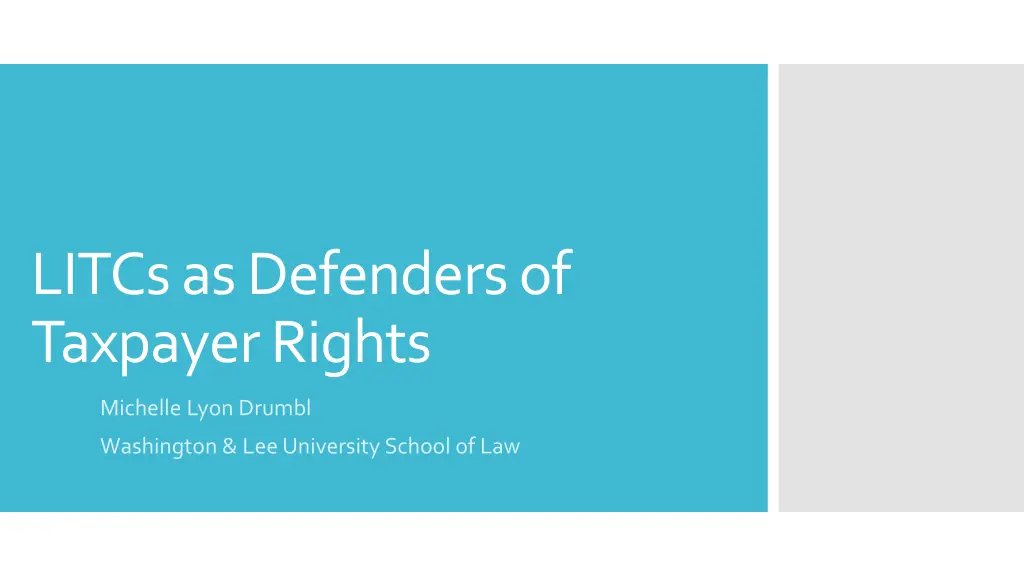
Defenders of Taxpayer Rights: Understanding the Role of LITCs
Explore the role of Low-Income Taxpayer Clinics (LITCs) in protecting taxpayer rights, including key provisions such as the right to quality service, fair representation, and challenging IRS decisions. Learn about the history of taxpayer rights codification and the challenges faced by the Internal Revenue Service today.
Download Presentation

Please find below an Image/Link to download the presentation.
The content on the website is provided AS IS for your information and personal use only. It may not be sold, licensed, or shared on other websites without obtaining consent from the author. If you encounter any issues during the download, it is possible that the publisher has removed the file from their server.
You are allowed to download the files provided on this website for personal or commercial use, subject to the condition that they are used lawfully. All files are the property of their respective owners.
The content on the website is provided AS IS for your information and personal use only. It may not be sold, licensed, or shared on other websites without obtaining consent from the author.
E N D
Presentation Transcript
LITCs as Defenders of Taxpayer Rights Michelle Lyon Drumbl Washington & Lee University School of Law
a) the right to be informed In 2015, Congress codified ten taxpayer rights : Internal Revenue Code 7803(a)(3) b) the right to quality service c) the right to pay no more than the correct amount of tax d) the right to challenge the IRS s position and be heard e) the right to appeal an IRS decision in an independent forum f) the right to finality g) the right to privacy h) the right to confidentiality i) the right to retain representation j) the right to a fair and just tax system
Background and context to the codification of taxpayer rights The Internal Revenue Service had adopted this list of taxpayer rights for itself in 2014 (prior to codification) Most of these rights existed in the Code prior to 2015, but not in one comprehensive place Three prior legislative acts were titled Taxpayer Bill of Rights 1988 first round of important limitations on IRS collection power 1996 Office of Taxpayer Advocate established 1998 Low-Income Taxpayer Clinic (LITC) grant program established
LITC Program provided federal matching funds to 138 clinics in 2017 USD $11.8 million in funding in 2017 The LITC Program: Federal funding to represent taxpayers These clinics are located in 49 of 50 states, plus Washington DC Attorneys, CPAs, volunteers, and law students work in clinics LITCs represent low-income taxpayers with controversies before the IRS, including representing taxpayers in U.S. Tax Court cases these taxpayers generally cannot afford a lawyer many would face challenges handling the matter themselves: lack of proficiency in English lack of time during business hours because they work inflexible schedules lack of internet access
Prior to 1988: A culture of abusiveness towards taxpayers Taxpayers had very few due process protections 1988 act provided a basic safety net for taxpayers when the bureaucratic machine goes awry Greatest Agency Challenges: Then and Now Now: Underfunding (not a new phenomenon) and automation Internal Revenue Service is underfunded despite having been tasked with burdensome new roles in recent years Funding has fallen 20% since 2010 IRS answers approximately 60% of phone calls Results in a greater reliance on automation Recent tax reform will exacerbate these challenges Agency estimates it will need between $400-500 M to implement the 2017 tax reform
Ensuring due process for taxpayers includes assisting those in financial hardship with collection alternatives What role are attorneys playing as defenders of taxpayer rights? Providing a check and balance against increased automation Many points of intersection with IRS other than simply owing money: Claiming social benefits (earned income tax credit) Health insurance credits Tax-related identity theft Right to obtain or renew a passport Collateral consequences of negative credit report
